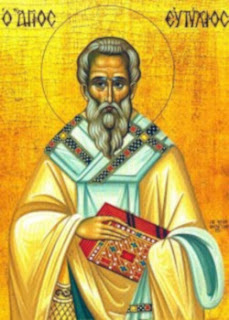Sainted Eutyches, Archbishop of Constantinople, was born in a village bearing the name "Divine" in the province of Phrygia. His father, Alexander, was a soldier, and his mother Synesia was the daughter of the Augustopolis priest Isichias. Saint Eutyches received the first rudiments of his education and a Christian upbringing from his grandfather the priest. Once during the time of a childhood game the boy wrote his own name with the title of Patriarch and by this seemed to predict his future service. He was sent off to Constantinople at age twelve for continuing further education. The youth persevered in his study of science and realised, that human wisdom is nothing in comparison to the study of Divine Revelation. He decided to dedicate himself to monastic life. Saint Eutyches withdrew into one of the Amasian monasteries and in it accepted the Angelic order. For his strict life he was made archimandrite of all the Amasian monasteries, and in 552 was appointed to the Patriarchal throne.
When the Fifth Ecumenical Council prepared to assemble during the reign of the holy nobleborn emperor Justinian (527-565), the metropolitan of Amasia was ill and he sent in his place Saint Eutyches. At Constantinople the aged Patriarch Saint Minas (536-552) beheld Blessed Eutyches and predicted that he would be the next Patriarch. After the death of the holy Patriarch Minas, the Apostle Peter appeared in a vision to the emperor Justinian and, pointing his hand at Eutyches, said: "Let him be made your bishop."
At the very beginning of his patriarchal service, Saint Eutyches convened the Fifth Ecumenical Council (553), at which the fathers condemned the heresies cropping up and pronounced them anathema. However, after several years there arose a new heresy in the Church, Aphthartodocetism or "imperishability" - which taught that the flesh of Christ, before His death on the Cross and resurrection, was imperishable and not capable of suffering.
Saint Eutyches vigourously denounced this heresy, but the emperor Justinian himself inclined towards it, and turned his wrath upon the saint. By order of the emperor, soldiers seized hold of the saint within the temple, tore off from him his patriarchal vestments, and sent him off into exile to an Amasian monastery (565).
The saint bore his banishment with meekness, and dwelt at the monastery in fasting and prayer, and he worked many miracles and healings.
Through his prayer the wife of a pious man, Androgenes, who before having borne to light only dead infants, now gave birth to two sons who lived to reach years of maturity. Two deaf-mutes received the gift of speech; and two little children, grievously ill, he restored to health. The saint healed a cancerous ulcer on the hand of an artist. The saint healed also another artist, anointing his diseased hand with oil and making over it the sign of the cross. The saint healed not only bodily, but also spiritual afflictions: he banished the devil out of a girl that had kept her from Holy Communion; he banished the devil out of a youth who had fled off from a monastery (after which the youth returned to his monastery); he healed a drunken leper, who, cleansed of his leprosy, stopped drinking.
During the time of an invasion by the Persians into Amasia and its widespread devastation for the inhabitants, by order of the saint they distributed grain to the hungry from the monastic granaries - and the stores of grain at the monastery, through his prayers, were not depleted.
Sainted Eutyches received of God a gift of prophecy: thus, he indicated the names of two successors to emperor Justinian - Justin (565-578) and Tiberias (578-582).
After the death of the holy Patriarch John Scholastikos, Saint Eutyches returned to the cathedra in 577 after his twelve year exile, and he again wisely ruled his flock.
Four and an half years after his return to the Patriarchal throne, Saint Eutyches on Thomas Sunday 582 gathered together all his clergy, gave them a blessing and in peace expired to the Lord.


No comments:
Post a Comment